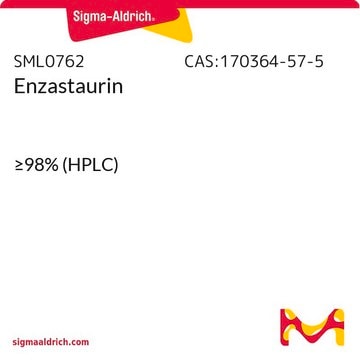S5921
Staurosporine
from Streptomyces sp., ≥95% (HPLC), film, protein kinase inhibitor
Sinónimos:
protein kinase c inhibitor, staurosporine, Antibiotic AM-2282
About This Item
Productos recomendados
Nombre del producto
Staurosporine from Streptomyces sp., for molecular biology, ≥95% (HPLC)
grade
for molecular biology
Quality Level
assay
≥95% (HPLC)
antibiotic activity spectrum
fungi
mode of action
enzyme | inhibits
storage temp.
2-8°C
SMILES string
CN[C@@H]1C[C@@H]2O[C@@](C)([C@@H]1OC)n3c4ccccc4c5c6CNC(=O)c6c7c8ccccc8n2c7c35
InChI
1S/C28H26N4O3/c1-28-26(34-3)17(29-2)12-20(35-28)31-18-10-6-4-8-14(18)22-23-16(13-30-27(23)33)21-15-9-5-7-11-19(15)32(28)25(21)24(22)31/h4-11,17,20,26,29H,12-13H2,1-3H3,(H,30,33)/t17-,20?,26-,28+/m1/s1
InChI key
HKSZLNNOFSGOKW-ZGQXJOJZSA-N
¿Está buscando productos similares? Visita Guía de comparación de productos
General description
Application
Biochem/physiol Actions
Features and Benefits
Analysis Note
signalword
Danger
hcodes
Hazard Classifications
Aquatic Chronic 4 - Carc. 1B - Muta. 1B - Repr. 2
Storage Class
6.1C - Combustible acute toxic Cat.3 / toxic compounds or compounds which causing chronic effects
wgk_germany
WGK 3
flash_point_f
Not applicable
flash_point_c
Not applicable
ppe
Eyeshields, Gloves, type P3 (EN 143) respirator cartridges
Elija entre una de las versiones más recientes:
Certificados de análisis (COA)
¿No ve la versión correcta?
Si necesita una versión concreta, puede buscar un certificado específico por el número de lote.
¿Ya tiene este producto?
Encuentre la documentación para los productos que ha comprado recientemente en la Biblioteca de documentos.
Los clientes también vieron
Artículos
Protein-based drug transporters are expressed in Sf9 cells. Understanding the specific mechanisms of tumor cell transporters is an essential aspect of chemotherapeutic drug design.
Protein-based drug transporters are expressed in Sf9 cells. Understanding the specific mechanisms of tumor cell transporters is an essential aspect of chemotherapeutic drug design.
Protein-based drug transporters are expressed in Sf9 cells. Understanding the specific mechanisms of tumor cell transporters is an essential aspect of chemotherapeutic drug design.
Protein-based drug transporters are expressed in Sf9 cells. Understanding the specific mechanisms of tumor cell transporters is an essential aspect of chemotherapeutic drug design.
Nuestro equipo de científicos tiene experiencia en todas las áreas de investigación: Ciencias de la vida, Ciencia de los materiales, Síntesis química, Cromatografía, Analítica y muchas otras.
Póngase en contacto con el Servicio técnico












